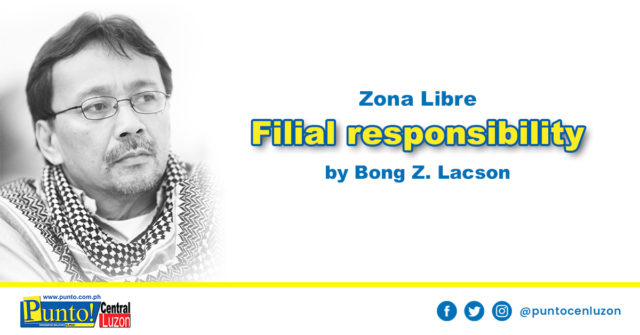“…THEY WHO protected the weakness of our infancy, are entitled to our protection in the infirmity of their age; they who by sustenance and education have enabled their off spring to prosper, ought in return to be supported by that off spring, in case they stand in need of assistance.”
So, Sen. Panfilo “Ping” Lacson – no relation to this writer – opened his explanatory note to Senate Bill No. 29 with that filial responsibility writ from the Commentaries on the Laws of England (1813).
The bill, to be known as “Parents Welfare Act of 2019,” obligates children to provide necessary support to aging, sick, and incapacitated parents. Failure to do so – for three consecutive months without justifiable cause – carries a penalty of imprisonment for one to six months or a fine of P100,000.
Further: “Whoever, having the care or protection of a parent in need of support, leaves such parent in any place with the intention of wholly abandoning the latter shall be punished with imprisonment of six years to 10 years and a fine of not less than P300,000.”
The bill thereby empowers old and sickly parents to file a petition for support before the court and ask for the issuance of a support order against their children who failed or refused to provide for their needs.
In such cases, the Public Attorney’s Office will provide legal representation to the parents and no court fees would be assessed. So, the bill mandates.
The establishment of “Old Age Homes” for the elderly, sick, or incapacitated parents in every province and highly urbanized city is also provided for in the bill.
“Filial responsibility statutes or the rules mandating children to provide support to their parents existed for over thousands of years…” furthered Lacson’s notes, breezing through early third century A.D. in Roman society, the ethical standards in medieval Europe, the statutes enacted by the English Parliament in 1597, the Code of Napoleon and the 19th century civil codes it spawned in Europe and Latin America, among others.
Solid arguments all in the making of sound judgments. And all too exclusively secular.
I could only speculate on the good senator’s total adherence to the inviolability of the separation of Church and State as probable explanation why he purposively did not ground SB No. 29 on what we – believers in God – hold as the greatest foundation of, indeed, the fountainhead whence sprang filial responsibility: Honor thy father and thy mother.
Yes, the Fourth of the fire-inscribed divine decrees on the tablets Moses brought down from Sinai that ordained for the old folks a niche second only to God’s in the hierarchy of human respect and devotion.
Belief – understanding as well – holds that the first three commandments invoke of Godman relationship, and the rest deal in human-to-human, with honoring the elders as primus inter pares.
Honor thy father and thy mother. The first commandment that has a promise added: “so that all may go well with you, and you may live a long time in the land.”
So, the Apostle Paul wrote to the Ephesians. So, it was written in Exodus 20:12. The reward of life for those who obey.
Else, be damned. As the Fourth carries too an injunction: “God’s curse on anyone who dishonors his father or mother.”
So, it was proscribed in Deuteronomy 27:16.
And it cannot be any more forthright than in Sirach 3:12-16: “O son, help your father in his old age, and do not grieve him as long as he lives; even if he is lacking in understanding, show forbearance; in all your strength do not despise him…Whoever forsakes his father is like a blasphemer, and whoever angers his mother is cursed by the Lord.”
Truly, suffused with reward and punishment, God’s law suffices. Now, were humans only respectful and obedient…





